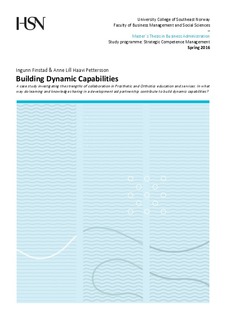| dc.description.abstract | This study is about knowledge sharing, dynamic capabilities and Social Corporate Responsibility (SCR), in the sense that its ambition is to investigate if and how a development aid project and partnership, initiated by a for-profit company in Norway, has benefited all the four entities in the partnership; a for-profit company in Norway, a governmental hospital in Malawi, and two schools; one in Tanzania and one in Cambodia.
The purpose of the study is to seek answers on how individual learning, in a development-aid partnership, translates into organizational effectiveness and competitive advantage through the concept of dynamic capabilities defined as:
A dynamic capability is a learned and stable pattern of collective activity through which the organization systematically generates and modifies its operating routines in pursuit of improved effectiveness. (Zollo & Winter, 2002, p. 340)
The theoretical basis for the study is a resource-based perspective, which describes human resources as the firm’s most important resource. The research method applied is qualitative case study, with an embedded multiple-case design. The four entities in the development aid partnership, serve as case studies. The thesis focus on in what way learning and knowledge sharing in a development aid partnership can contribute to build dynamic capabilities?
There is limited research established on how dynamic capabilities develop, and how the individuals can affect an organizations development of dynamic capabilities. We find it very interesting to investigate the links between individual learning, learning mechanisms and dynamic capabilities.
Our findings suggest that knowledge sharing in development aid partnership, through long term exchanges of staff, has the potential to develop dynamic capabilities through increasing the awareness about “know how” and “know why”, which increases the individual learning capacity. The rationales being that you have to understand what you are doing, to be able to do it better. | nb_NO |
